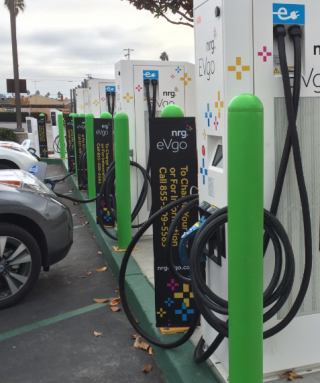 There’s no doubt California will need more charging stations, as it aggressively pushes for more zero-emission vehicles (ZEVs). The question is how many. During his Global Climate Action Summit in San Francisco, Governor Jerry Brown today signed AB 2127 by Assemblymember Phil Ting (D-San Francisco) to require the California Energy Commission to assess the state’s current electric vehicle (EV) charging infrastructure and determine how many more stations will be needed in the future. The assessment will be used to identify where there are deficiencies across the state.
There’s no doubt California will need more charging stations, as it aggressively pushes for more zero-emission vehicles (ZEVs). The question is how many. During his Global Climate Action Summit in San Francisco, Governor Jerry Brown today signed AB 2127 by Assemblymember Phil Ting (D-San Francisco) to require the California Energy Commission to assess the state’s current electric vehicle (EV) charging infrastructure and determine how many more stations will be needed in the future. The assessment will be used to identify where there are deficiencies across the state.
“More Californians would buy clean cars if there were more charging stations,” said Ting, author of AB 2127. “We need a clearer picture of where we are today, so we can build-out our charging infrastructure in a way that incentivizes greater EV adoption.”
The transportation sector accounts for nearly 40% of greenhouse gas emissions, and ZEVs are crucial to reducing air pollution. To accelerate improvements in air quality, Governor Brown signed Executive Order B-48-18 earlier this year, which set the goal of five million clean cars on the road in California by 2030. But the state’s EV charging infrastructure is lagging and continues to be one of the greatest barriers to widespread consumer adoption of this clean technology. The installation of more charging stations is imperative if California is to reach its 2030 target and support an increase in EVs.
State agencies, utility companies and the private sector are working to bolster California’s EV charging infrastructure, but there is not one entity coordinating a centralized effort that can give us an overall picture and direction.
"This is an important step for California, as it transitions to an electric transportation future. Governor Brown's signature of AB 2127 will result in better planning, more efficient use of public dollars and smarter implementation of the state’s ongoing ZEV efforts across all vehicle classes," said Amisha Rai, Senior Director of California Policy at Advanced Energy Economy, the bill’s sponsor.
AB 2127 takes effect on January 1, 2019. Thereafter, reassessment of the state’s infrastructure plan must occur every two years.
Media Contact: Nannette Miranda (415) 557-2312
# # # #